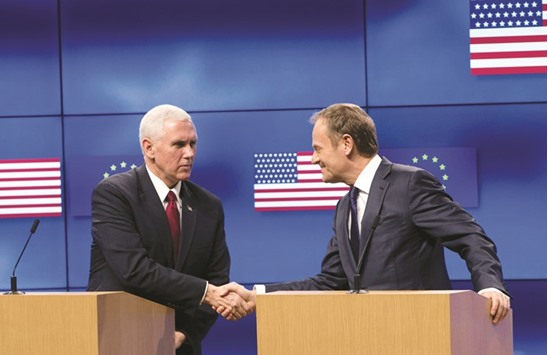The United States remains committed to a “continued co-operation and partnership” with the European Union, US Vice-President Mike Pence said yesterday during his first official visit to Brussels.
Pence’s affirmation of EU-US relations comes after US President Donald Trump had called Britain’s decision to leave the European Union a “fantastic thing” and suggested that he advocated disintegration of the 28-member bloc.
“Today, it is my privilege on behalf of President Trump to express the strong commitment of the United States to continued co-operation and partnership with the European Union,” Pence said.
He noted that the two continents have a shared heritage and the common purpose of promoting “peace and prosperity through freedom, democracy and the rule of law”.
During a press conference at Nato, Pence tried to clarify the Trump administration’s mixed messages regarding the European unity, saying that the US was committed to its partnership with the EU, while also respecting Britain’s decision to leave.
“We respect the determination of the people of Great Britain as manifested in Brexit and we respect the judgement of the peoples of Europe in the European Union,” Pence said.
He also reaffirmed the US commitment to “free, fair and flourishing economies” on both sides of the Atlantic, noting that transatlantic commerce supports 14mn jobs in the US and the EU.
He added that maintaining economic growth would require “hard but necessary choices”.
Pence made no reference to the future of the Transatlantic Trade and Investment Partnership (TTIP), a far-reaching free trade deal between the EU and the US that was being negotiated under former US president Barack Obama.
Trump had previously suggested that the agreement would not be implemented during his presidency.
European Council President Donald Tusk welcomed continued US commitment to the EU and thanked Pence for being “open and frank” during their discussions.
“Too many new and sometimes surprising opinions have been voiced over ... our relations and our common security for us to pretend that everything is as it used to be,” Tusk said. “Today, I heard words which are promising for the future, words which explain a lot about the approach of the new administration in Washington.”
Tusk warned against advocating for the disintegration of the EU, saying that “the world would be a decidedly worse place if Europe were not united”.
During a meeting with North Atlantic Treaty Organisation (Nato) Secretary General Jens Stoltenberg, Pence reaffirmed the United States’ commitment to Nato, while also stressing the need for allies to increase their defence funding to meet the Nato-mandated target of 2% of national gross domestic product (GDP) by 2024.
“America will do our part, but Europe’s defence requires Europe’s commitment as much as ours,” Pence said. “The president expects real progress by the end of 2017.”
“If you have a plan to get there, our alliance needs you to accelerate it,” he said. “If you don’t yet have a plan, these are my words, not his – get one. It is time for actions, not words.”
He did not specify what steps the US was planning to take if progress was not achieved.
“I don’t know what the answer is to ‘or else’, but I know that the patience of the American people will not endure forever,” Pence said.
Nato leaders, stung by Russian intervention in Ukraine, decided in 2014 to increase defence spending but progress since then has been painfully slow.
Trump warned repeatedly on the campaign trail last year that the allies could no longer expect a free ride and Pence repeated the message after talks with Stoltenberg.
US Defence Secretary James Mattis delivered a similar message at a Nato defence ministers meeting last week, saying that Washington could “moderate” its commitment if allies fail to pay up.
Trump sent Pence, Mattis and US Secretary of State Rex Tillerson to Europe in the past week to reassure nervous allies that the new administration would stand by near-70 year US commitments to Nato and European security in the face of a more assertive Russia.
But all three also drove home the message that the allies must play their part in full or that commitment would inevitably be called into question.
So far, of the 28 Nato members, only the United States, Britain, Poland, Greece and Estonia have met the 2% target.
The target is controversial however – critics say that a blind drive to 2% ignores a commitment in kind made by some countries, such as France or Britain, in mounting anti-terror operations on their own account.
Additionally, if Germany for example were to meet the target, it would mean a €30bn increase in Berlin’s military budget to some €70bn.
That would make it Europe’s biggest military spender and as diplomatic sources put it, cause some of Germany’s neighbours some unease.
German spending currently runs at 1.2% of output while the United States spends 3.6% and accounts for more than 70% of combined Nato outlays.
Reflecting on the “horrific” terrorist attack on Brussels last March, Pence said that Nato needed to play a bigger role in the fight against terrorism.
“I want to assure the people of Brussels and all the people of Europe that your pain is our pain and your loss is our loss,” Pence said.

Pence with European Council head Donald Tusk during their news conference at the European Commission in Brussels.
